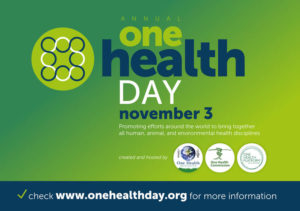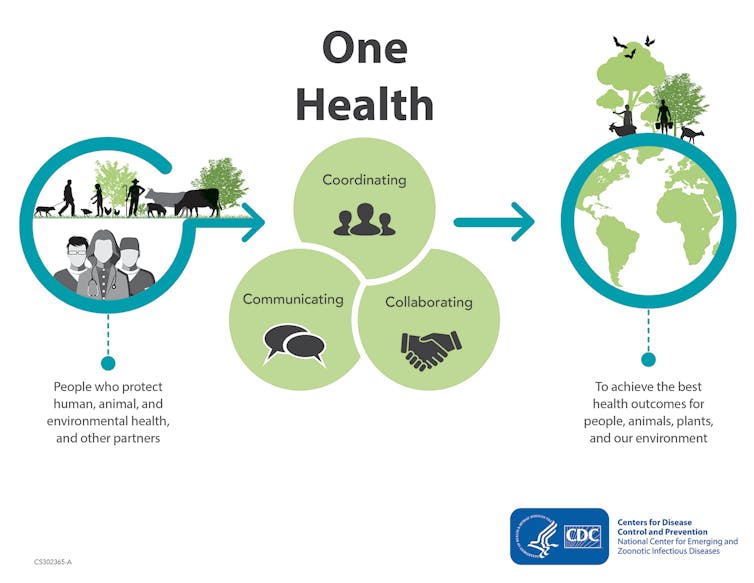One Health Publications
Filipe Dantas Torres – winner of the 2022 WSAVA One Health Award – BugBitten (biomedcentral.com)
October 7, 2022
 For more information about One Health and what you can do to promote it, the One Health Initiative and the One Health Commission publish regular blogs and news. One Health Day – November 3rd – will see many organisations hosting articles and events to promote One Health. Look out for how you can get involved, or even how your work is already promoting One Health in some way…may be you are already a One Health Champion without even realising it!
For more information about One Health and what you can do to promote it, the One Health Initiative and the One Health Commission publish regular blogs and news. One Health Day – November 3rd – will see many organisations hosting articles and events to promote One Health. Look out for how you can get involved, or even how your work is already promoting One Health in some way…may be you are already a One Health Champion without even realising it!
View Publication
How study of naturally occurring ocular disease in animals improves ocular health globally in: Journal of the American Veterinary Medical Association – Ahead of print (avma.org)
October 6, 2022
Conclusions
The study of the etiopathogenesis, pathophysiology, genetics, and treatment of naturally occurring ocular disease in veterinary patients, especially dogs, cats, and horses, translates well to human eye disease because of similarities of ocular anatomy, physiology, and shared environments between animals and humans. These similarities support the collaborative, multisectoral, and transdisciplinary approach that defines the one health initiative. Veterinarians at all levels, therefore, are at the forefront of the one health process through their study of ocular disease, whether it is in their practice, clinic, university hospital, or research laboratory. We all share the one health goal of achieving optimal ocular health for all by recognizing the interconnection between people, animals, and their shared environment.
View Publication**TWiV 939: From lizards to Lassa with *Tom Monath, MD (microbe.tv)
October 4, 2022

*Dr. Monath is a co-founding member of the One Health Initiative Autonomous pro bono Team: Laura H. Kahn, MD, MPH, MPP ▪ Bruce Kaplan, DVM ▪ Thomas P. Monath, MD ▪ *Lisa A. Conti, DVM, MPH ▪ Thomas M. Yuill, PhD ▪ Helena J. Chapman, MD, MPH, PhD ▪ Craig N. Carter, DVM, PhD ▪ Becky Barrentine, MBA ▪ Richard Seifman, JD, MBA *Deceased November 6, 2020
** “One Health” mentioned at time 130.20 – 131.20.
View PublicationHelping communities in need, wherever that may be (ucdavis.edu)
September 28, 2022
“… Committed to improving the well-being of all
UC Davis Health uses an interdisciplinary approach, known as One Health, on issues surrounding global health. This vision of One Health recognizes the interconnectedness of people, animals, and the environment and aims to identify and address the fundamental causes of poor health to improve the well-being of all. …”
View PublicationOne Health: A Paradigm Whose Time Has Come? – Impakter
September 25, 2022
SEE: One Health: A Paradigm Whose Time Has Come? – Impakter — https://impakter.com/one-health-paradigm-time-come/
Finding common ground between countries and institutions to deal with our common health future is still an uphill road at the upcoming G20 in Indonesia
View PublicationUnderstanding leptospirosis: application of state-of-the-art molecular typing tools with a One Health lens in: American Journal of Veterinary Research Volume 83 Issue 10 (2022) (avma.org)
September 23, 2022
Abstract
Leptospirosis is an archetypal One Health problem as described in the companion Currents in One Health article in the October 2022 issue of the Journal of the American Veterinary Medical Association by Sykes et al. A thorough understanding of leptospirosis requires a detailed analysis of the elaborate interplay among pathogenic leptospiral strains, host species, and the environment. Such an understanding is required to inform appropriate preventative measures including vaccine design, prophylaxis efforts, educational programs that help to reduce exposure to pathogenic spirochetes, as well as policy development. Because of the complex epidemiology of leptospirosis, a One Health approach as defined by the One Health Initiative Task Force is critical—an approach that calls for “the collaborative efforts of multiple disciplines working locally, nationally, and globally, to attain optimal health for people, animals and our environment.” Over the last three decades, progressive advances in cutting-edge molecular typing techniques, as well as our ability to rapidly generate and share large amounts of sequence data through establishment and growth of databases, have been central to accelerating a One Health understanding of the epidemiology of leptospirosis. Nevertheless, our dependence on serotype information because of the serovar-specific nature of current vaccines means that laborious serotyping efforts continue. With the advent of new approaches such as mRNA vaccines that are based on lipopolysaccharide immunogens, sequence- and/or proteomics-based typing methods may replace these methods.
View PublicationOne Health in action: Rabies training brings together human and animal health professionals in Côte d’Ivoire (who.int)
September 23, 2022
“This international rabies training aims to foster the emergence of collaborations between young professionals from different disciplines and sectors, and from diverse African countries. It is expected that these actors will contribute to the strengthening of the One Health approach in their respective countries to achieve the goal of zero human rabies cases by 2030.”
View PublicationMonkeypox outbreak highlights need for One Health | EurekAlert!
September 23, 2022
“… They conclude by suggesting that a One Health approach to preventing further zoonotic disease outbreaks could incorporate promoting alternatives to bushmeat, routinely vaccinating people at high risk of exposure and educating people in hygienic procedures such as the wearing of gloves when handling live and dead wild animals.”
View PublicationGutter to gut: How antimicrobial-resistant microbes journey from environment to humans (theconversation.com)
September 19, 2022
“… A One Health approach
It is evident that antimicrobial resistant microbes surround us, and it is normal to feel concerned. But what is even more important to recognize are the tiny steps we all can still adopt. This includes ensuring patients are treated with the appropriate antibiotic in the right dose.

On a global level, understanding the transmission routes for resistant microbes is a part of a One Health approach. The holistic concept of One Health acknowledges that the health of humans is interconnected to the health of animals and our surrounding environment. This enables bringing together resources and policies to monitor and tackle antimicrobial resistance.
Indeed, resistant microbes are running a marathon with antimicrobials, and we need to take measures to slow down their pace. In the long run, this would ensure that the antimicrobials would continue to support human survival. …”
View PublicationQuick Links
-
Please see MONOGRAPH in Veterinaria Italiana
“One Health – One Medicine”: linking human, animal and environmental health
Read More -
History of the One Health Initiative team and website (April 2006 through September 2015) and the One Health Initiative website since October 1, 2008 … revised to June 2020 and again to date February 2021
Read More -
Vaccines for zoonoses: a One Health paradigm
SciTech Europa Quarterly (March 2018) – Issue 26
Read More -
Pan European Networks SciTech Europa Quarterly
SciTech Europa Vaccines for zoonoses: a one Health paradigm – Pages 227-229 (Read PDF) “One of the One Health Initiative team’s co-founders and leaders is an internationally-recognized eminent physician…
Read More Read PDF

